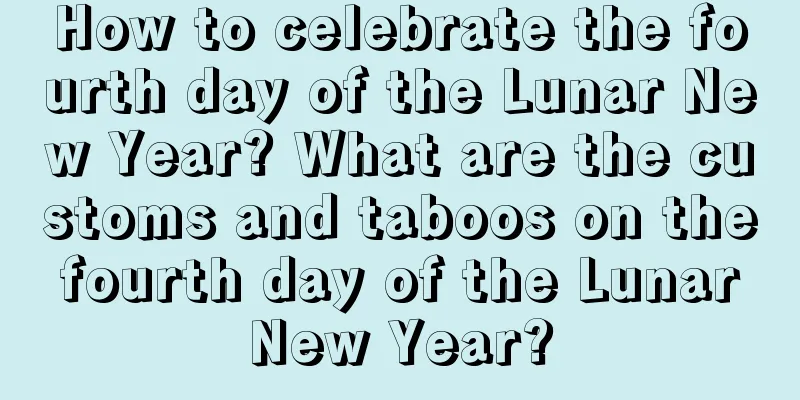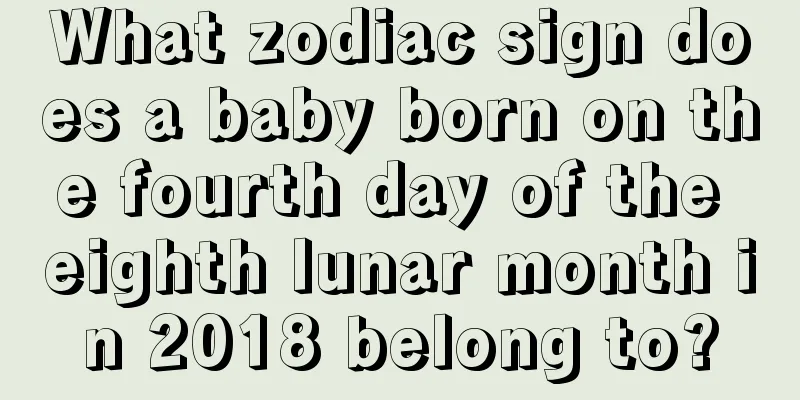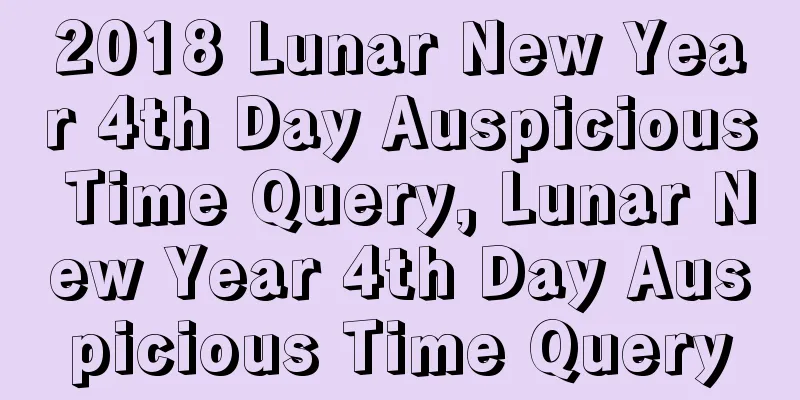How to celebrate the fourth day of the Lunar New Year? What are the customs and taboos on the fourth day of the Lunar New Year?

Introduction: In most parts of our country, the Chinese New Year lasts from the first day to the fifteenth day of the first lunar month, which is a very long festival. People often only pay attention to the first three days of the festival, but in fact, the customs on each day of the New Year are different and you should learn more about them. So, how do we celebrate the fourth day of the Lunar New Year? What are the customs and taboos? Let’s find out with the editor below! A year's plan begins with spring, and the Spring Festival is an important traditional festival of ours. Do you want to know more about the Spring Festival? Come and take a look at the Spring Festival special topic carefully prepared by Mr. Shui Mo!1. Customs on the fourth day of the Lunar New Year - "welcoming the Kitchen God and sending off the Fire God".The fourth day of the Lunar New Year is when the gods return to the world from heaven. There is a saying that "send off the gods early in the morning, and welcome them late". It means that sending off the gods should start early in the morning, while welcoming them in the afternoon is not too late. As for offerings, three kinds of meat, fruits, wine and food must be complete, and incense, candles and gold clothes must be burned. If the boss wants to fire someone, he will not invite him to worship the gods on this day.2. Customs on the fourth day of the Lunar New Year - Receiving the Five RoadsOriginally it meant to welcome the five traveling gods, and later evolved into welcoming the five wealth gods. In the old days, after the Spring Festival holiday, merchants would usually invite the Five Gods of Wealth on the fourth night of the New Year and open for business on the fifth day for good luck. At 3:00 p.m. on the fourth day, preparations for the five-way reception ceremony began and ended at 9 or 10:00 p.m. First, set up the table, usually two eight-immortal tables put together. The first table is filled with fruits such as tangerines and sugar cane, implying broad financial prospects and a sweet life; the second table is filled with pastries, implying promotion and evergreen; the third table is the main meal, with whole pigs, chickens, fish, and Yuanbao soup. Half of the table is filled with rice, noodles and vegetables. A scallion is inserted in a bowl of road rice, and a thousand-year-old red is inserted in the scallion tube, which means excitement and prosperity every year. The wine and food on the third table can only be served after the five wealth gods have been connected. Everyone is full of hope of getting rich, hoping that the God of Wealth can bring gold, silver and treasures to their homes and make them rich in the new year. To receive the five gods of wealth, the host must bring incense and candles to the temples of the God of Wealth in the east, west, south, north and center respectively to invite them. Every time a god of wealth comes, a string of firecrackers will be set off in front of the door. After receiving all the gifts, the host and the servants will worship the God of Wealth in turn. After the worship, they will burn the horse curtain on the original altar to send off the God of Wealth. The ceremony was finally over. At midnight on the fourth day of the first lunar month, prepare sacrificial animals, cakes, fruits, incense and candles, ring gongs and drums, burn incense and worship, and worship the God of Wealth respectfully. It is commonly believed that the fifth day is the birthday of the God of Wealth. In order to compete for profits, people welcome him on the fourth day, which is called "抢路头" or "迎财神". When welcoming the God of Wealth, one must offer a sheep's head and a carp. Offering a sheep's head means "good luck", while offering a carp means that "fish" and "surplus" are homophones, which is a good omen. People firmly believe that as long as they can get the appearance of the God of Wealth, they will become rich. Therefore, every Chinese New Year, people open the doors and windows, burn incense, set off firecrackers, and light fireworks at midnight on the fifth day of the first lunar month to welcome the God of Wealth. After receiving the God of Wealth, everyone has to have a road-opening wine feast, which often lasts until dawn. Everyone is full of hope of getting rich, hoping that the God of Wealth can bring gold, silver and treasures to their homes and make them rich in the new year. During the Republic of China, shops would open their doors from midnight on the fourth day of the Lunar New Year to the early morning of the fifth day, with bright lights and candles, and altars set up to welcome the "God of Wealth", and people would flock to the God of Wealth's temple to "exchange for gold ingots".3. The custom on the fourth day of the Lunar New Year: eating Zheluo to “get rid of poverty”The whole family will eat Zheluo together, clean up the New Year's goods, and go to the yard to prepare to "throw away poverty". On the fourth day of the Lunar New Year, the whole family eats Zheluo together. The so-called Zheluo is a hodgepodge of leftover food from the past few days, to clean up the New Year's goods. Dust the room, sweep the floor, and pile the garbage in the yard ready to "throw away poverty." On this day, beef and mutton shops have to burn incense at the Horse Temple, because the Sheep King, Cattle King and Horse King are all enshrined in the Horse Temple, and the Sheep King statue in the Nanjiao Horse Temple is the most famous. Most shops will host a banquet for their employees and distribute red envelopes on the fourth night of the New Year. There was an old saying in Beijing in the past: "I'm not afraid of heaven or earth, but I'm afraid of the shopkeeper speaking Mandarin on the fourth night of the New Year." There were wine and food at the banquet, and the custom was to eat buns after drinking. The shopkeeper then raised his glass to congratulate everyone and said "thank you for your hard work". This is called "official language". After the official speech, the buns were served. The shopkeeper picked up the buns himself and put them in the bowl of whoever the bun was placed in. That person was implied to have been fired. The fired person would automatically pack up his luggage and leave after the meal, so this banquet was commonly known as "eating the get-out buns."4. The custom of the fourth day of the Lunar New Year - tying up the God of FireIn some rural areas of the north, there is a custom of tying up a fire god by tying corn stalks or wheat stalks onto a stick, lighting it, and then sending it from one's home to a river, which represents a year without fire in the home.5. Customs on the fourth day of the Lunar New Year - Welcoming the Kitchen GodThe Kitchen God will check the household registration, so every household has to stay home, prepare rich fruits, burn incense and candles, and set off firecrackers to welcome him.6. Taboo on the fourth day of the Lunar New Year - No needleworkFrom the first to the fourth day of the New Year, shops are closed and women are not allowed to use needles and thread.Summary: The above article content is the analysis of the customs and taboos of the fourth day of the Lunar New Year that the editor wants to introduce to readers for your reference. I hope that everyone can learn more about our country’s traditional customs and culture and feel the charm of traditional culture! |
<<: How is Sagittarius’ health fortune during the 2017 Spring Festival?
>>: What should we pay attention to on the third day of the Lunar New Year in 2017?
Recommend
Is it suitable to pick up the car on June 7, 2019?
The memory of June is accompanied by scorching he...
When is the Mid-Autumn Festival in 2017? Is the Mid-Autumn Festival in 2017 suitable for getting a haircut?
Introduction: In our current life, we are accustom...
Can I move house on the 20th day of the sixth lunar month in 2017? Can I move into a new home?
1. What day is June 20th in the lunar calendar of...
Will it still be hot after the Beginning of Autumn on August 7, 2022? Is the Beginning of Autumn this year a late autumn?
When the sun reaches 135 degrees of ecliptic longi...
What festival is on the first day of the first lunar month? What are the taboos to pay attention to on the first day of the Lunar New Year?
Introduction: In our country's tradition, the ...
Can I pick up the new car on December 26th of the lunar calendar in 2020?
Can I pick up the new car on December 26th of the...
Is the second day of the first lunar month in 2018 an auspicious day? Is the second day of the first lunar month a suitable day for weddings?
Introduction: In our country’s traditional culture...
What are the do's and don'ts on the third day of the tenth lunar month in 2018?
Every day has its good and bad days, auspicious a...
Where is the direction of the God of Happiness on March 29th of the lunar calendar 2018?
The arrival of the third month of the lunar calen...
Is the 28th day of the sixth lunar month in 2019 a suitable day to pick up the car?
Whether today is a good day or not, and whether w...
Is it a good idea to pick up the car on October 29th of the lunar calendar in 2018?
The arrival of the tenth month of the lunar calen...
What constellation is the 22nd day of the twelfth lunar month in 2018?
Jia does not open a warehouse and Zi does not ask ...
Check the lunar calendar for the third day of April in 2018. Is it a good day?
April is also known as Mengxia, Yinyue and Meiyue...
Where is the God of Wealth on the 19th day of the eighth lunar month in 2021? Check the God of Wealth's time and location
The heat retreats and the sky becomes clear, the a...
Is May 11th of the lunar calendar in 2022 an auspicious day for opening a business? Is it auspicious to open the business on that day?
You need to choose a good time to open a business....









